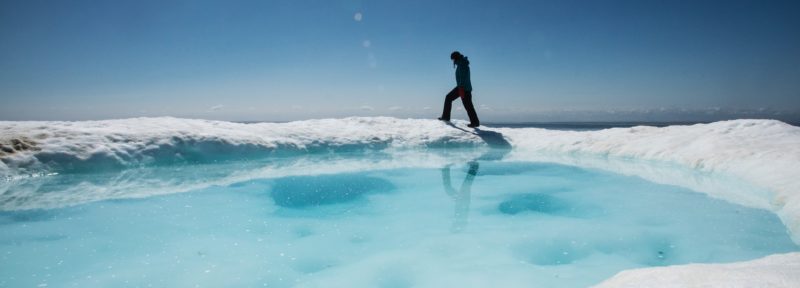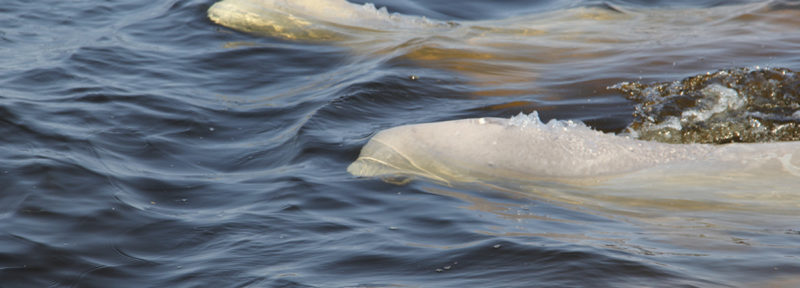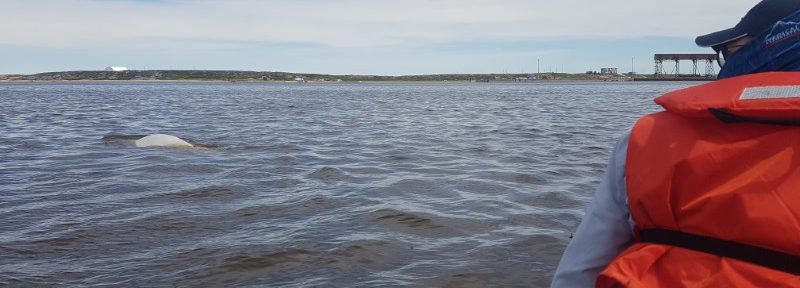New Land-based Learning and Healing Project for Youth to Launch in Churchill
Kono Tattuinee, president of Kivalliq Inuit Association, stands beside Linda Larcombe, associate professor at the University of Manitoba, in a tent ring at Hubbard Point.
Credit: Linda Larcombe
An innovative new land-based learning and healing project will help connect youth with Indigenous archaeological and heritage sites along the coastline near Churchill, Manitoba over the next three years.
The project team will create and evaluate a program that will enable youth to study archaeological sites and artifacts left by Inuit, Dene and Cree communities that have thrived in this region for thousands of years.
The project, funded by a grant from the Canadian Institutes of Health Research, will be led by Dr. Linda Larcombe, a University of Manitoba professor and anthropologist, in partnership with Inuit, Dene and Cree communities, Oceans North, Parks Canada, the Manitoba Museum, the Town of Churchill and others. Indigenous partners in the funding application include the Kivalliq Inuit Association, Sayisi Dene First Nation, and Fox Lake Cree Nation.
“This is really a timely project meant to instill a sense of identity among youth and support their mental health,” said Larcombe, who is an associate professor in the departments of Internal Medicine, Community Health Sciences, and Medical Microbiology and Infectious Diseases.
The objective this summer will be to build relationships among the research team and with local youth and Knowledge Keepers in Churchill, visit cultural heritage sites and plan for the next three years.
“There is absolutely a gap in our understanding of how Inuit, Dene and Cree used the land in the past,” Larcombe said. “There’s a lot to be learned by having them as research partners.”
A drone image of tent rings at an archaeological site on the Churchill peninsula.
Credit: Linda Larcombe
Indigenous connections to the land have always been crucial to cultural identity, sovereignty and well-being. But these important ties have been disrupted by the impact of colonialism, from residential schools to foster care to the inequities in access to health care. This project will explore how learning about cultural heritage sites, and deepening ties to the land, can foster increased wellness, healing and leadership development among Indigenous youth.
Planning for the project will begin this month as team members meet with local partners and organize a ceremonial gathering to launch the project in August. They have also begun to compile a database of the archaeological work that has been done dating back to the 1960s at the more than 50 cultural sites in the Churchill region. This will also include an inventory of the thousands of artifacts that have been collected. That includes contacting many different institutions where the archaeological records and artifacts may reside.
“We want to be able to share this archaeological research with the Inuit, Dene and Cree communities, and find out what they know about how the land has been used,” Larcombe said. “Their voices need to be part of the narrative.”
A drone image of tent rings at an archaeological site on the Churchill peninsula.
Credit: Linda Larcombe
During the next three years, the project plans to hire youth between the ages of 18 and 30 to work with the research team. This could include everything from learning how to use mapping software and interpreting drone photos, to doing field work at cultural sites.
“The youth will be story catchers, learning from Elders and bringing back their experiences on this project to their communities,” said Paul Labun, director of program development with Oceans North. “There have been hunting camps in this region for thousands of years. Archaeology is an important way to understand the longevity and continuity of biological abundance.”
Each summer, beluga whales return in large numbers to the estuaries near Churchill and have long been an important source of sustenance for Indigenous communities. In 2014, Oceans North worked with the Inuit Heritage Trust to sponsor an archaeological dig near the Seal River estuary, 71 kilometres north of Churchill, to document hunting camps used by Inuit and their Thule ancestors.
A map of Hubbard Point showing archaeological sites. This area 71 km north of Churchill, though the project discussed here focuses on the coastline around Churchill.
Oceans North has also long supported the creation of a national marine conservation area to protect the beluga estuaries of western Hudson Bay, where the world’s largest population of beluga whales migrate each summer to feed and reproduce.
Ruth Teichroeb is a regular contributor to Oceans North and former communications director.








